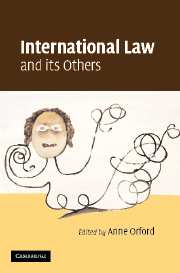Book contents
- Frontmatter
- Contents
- Acknowledgments
- Notes on the contributors
- 1 A jurisprudence of the limit
- PART I Sovereignty otherwise
- 2 Speaking law: on bare theological and cosmopolitan sovereignty
- 3 Law as conversation
- 4 Corporate power and global order
- 5 Seasons in the abyss: reading the void in Cubillo
- PART II Human rights and other values
- PART III The relation to the other
- PART IV History's other actors
- Index
2 - Speaking law: on bare theological and cosmopolitan sovereignty
Published online by Cambridge University Press: 20 July 2009
- Frontmatter
- Contents
- Acknowledgments
- Notes on the contributors
- 1 A jurisprudence of the limit
- PART I Sovereignty otherwise
- 2 Speaking law: on bare theological and cosmopolitan sovereignty
- 3 Law as conversation
- 4 Corporate power and global order
- 5 Seasons in the abyss: reading the void in Cubillo
- PART II Human rights and other values
- PART III The relation to the other
- PART IV History's other actors
- Index
Summary
Over the last few years, sovereignty has become a dirty word and an endangered concept. The conventional image of sovereignty as absolute, illimitable and indivisible has come under concerted attack on many fronts. In theory, we find it in the debates about humanitarian intervention and cosmopolitanism, the European constitution and federalism, human rights and judicial universal jurisdiction. We see it in the great premium placed on ethics and morality, in the emphasis on the effects of evil and affect of trauma, and in the normative turn in international law and relations. The dominant realist model is being gradually replaced by the so-called constructivists who place rules, morals and principles at the centre of international relations and politics. International lawyers have recently discovered the neo-Kantian programmes of Rawls and Dworkin, and their social democratic version in Habermas, at a point when their domestic proponents have started noticing the slightly unrealistic claims of these grand system-builders.
Globalization and localization have been eating away equally inexorably at the sovereign structure. Human rights, free market and good governance clauses are routinely imposed as preconditions for aid and trade agreements. Economic sanctions are used to protect citizens from their brutal governments. Finally, violence and war have been put in the service of humanity, human rights and the humanitarian agenda of the new world order. Our postmodern just wars have linked violence and occupation with demands for justice and morality.
- Type
- Chapter
- Information
- International Law and its Others , pp. 35 - 56Publisher: Cambridge University PressPrint publication year: 2006
- 7
- Cited by



